You’ve counted every calorie and checked them twice.
You’ve logged every step and rep, every day.
You’ve bought every supplement that might possibly help.
And you’re still not losing weight.
What the hell?
You know how a calorie deficit works and you’re not overeating.
You know how to prevent “metabolic damage” and aren’t starving yourself.
And you know you’re working way too damn hard in the gym to see the same dismal sight in the mirror and on the scale every day.
Well, when the “obvious” reasons for a weight loss plateau are eliminated, the culprit is often water retention. And when water retention is the problem, it’s important that you address it correctly.
If you do what most people do–exercise even more and eat even less–you’ll likely make the problem even worse.
The emotional firestorm of anger and frustration will burn even hotter…and the only hope for extinguishing it will likely become a long, greasy binge.
I don’t want that to happen to you.
So in this article, I’m going to break it all down: what causes water retention, what works for getting rid of water weight and what doesn’t, and more.
Let’s get to it.
Table of Contents
+Want to listen to more stuff like this? Check out my podcast!
What Causes Water Retention?
First, let’s clarify that the type of water retention we’re talking about in this article isn’t the medical condition edema.
That’s an indication that something is seriously wrong–maybe even life threateningly wrong–and requires immediate medical attention.
The type of water retention we’re talking about here threatens nothing but our vanity.
It’s the jiggly layer covering our abs, hips, and thighs that won’t seem to disappear no matter how little we eat or how much we exercise.
There are three primary causes of this type of water retention…
Elevated cortisol levels.
Cortisol is a hormone produced by the adrenals in response to stress and low blood sugar levels.
Almost every cell has receptors for cortisol so its effects are myriad and include influencing blood sugar and fluid retention levels, the metabolism of food, the central nervous system, and more.
Under normal conditions, cortisol doesn’t cause water retention problems. Under abnormal conditions, however, which we’ll talk about in a minute, it does.
Sodium and potassium imbalances.
Sodium is well absorbed by cells and brings water in with it.
Thus, when you eat a large amount of sodium, it can cause cells to temporarily retain water until balanced can be restored to cellular fluid levels. This is also why when you restrict sodium intake, water retention decreases.
Potassium plays a vital role in restoring this cellular fluid balance. Whereas sodium sucks water into cells, potassium pumps it out, and this is why research shows that restricting potassium intake can increase fluid retention.
Not drinking enough water.
If you don’t give your body enough fluids it causes adaptations that increase water retention.
Let’s take a more in-depth look at each of these points.
How Cortisol Can Cause Water Retention

To learn more about how cortisol levels affect water retention, let’s review a fascinating bit of research conducted decades ago known as the “Minnesota Starvation Experiment.”
Led by Dr. Ancel Keys, its purpose was to study the physical and psychological effects of starvation and create an effective regimen for helping starved POWs resume normal eating patterns and metabolic functions.
The experiment was conducted with 36 volunteers (war protesters that chose this over shipping overseas) and started with 12 weeks of daily hard labor and a “maintenance” diet of about 3,200 calories.
Next came the 6-month “semi-starvation” phase of the investigation, which consisted of cutting calorie intake in half to about 1,500 calories while maintaining the physical labor routine.
The investigators adjusted each man’s diet along the way with the goal of producing a ~25% reduction in body weight by the end of the 6-month period (yikes).
After the semi-starvation period, there was 20 weeks of “metabolic rehabilitation,” which consisted of restricted and unrestricted increases in calorie intake.
There’s quite a bit of interesting information in the published findings of the study, but I want to zoom in on one observation in particular here.
In the beginning of the experiment, the men generally lost weight in predictable and linear fashion of about two pounds per week, every week.
After some time, though, weight loss became strangely nonlinear. Nothing would change on the scales for several weeks and, literally overnight, “bursts” of weight loss would occur, with men weighing in several pounds lighter than the day before.
What researchers discovered is they were seeing the effects of dramatic increases and decreases in water retention. In the world of bodybuilding, this is known as the “whoosh effect.”
That is, the men did lose fat in the weeks where weight didn’t change but it was offset by equal, or even greater, amounts of water retention.
Now, you’re probably wondering what triggered the “whooshes” in the prisoners.
Well, some occurred at random but scientists found that they most often followed acute increases in calorie intake.
For example, at the experiment’s halfway mark, a 2,300-calorie meal was served to celebrate. The scientists noted that many of the men woke up several times that night to pee and, the next morning, were several pounds lighter.
Now, what was going on here exactly? What was causing the men’s bodies to retain large amounts of water and why did eating large amounts of food reverse this?
Well, the primary culprit was the hormone cortisol.
Research shows that a prolonged calorie deficit dramatically raises cortisol levels. This causes quite a few unwanted effects in the body including increased water retention.
Spike your cortisol levels and you’ll also spike the amount of water your body holds and look bloated.
That being so, you’d expect a large reduction in cortisol levels to do the opposite then, right?
Well, that’s exactly what happened to the Minnesota Experiment patients. The feast that triggered the whoosh substantially lowered cortisol levels, which in turn caused the rapid expulsion of water.
This is why a “refeed day” will often produce a weight loss “whoosh” and why weight loss will often continue during a period of reverse dieting.
So, bringing this back to the topic at hand, the point is this:
If your cortisol levels are chronically elevated, you’re going to have problems with water retention.
How Sodium and Potassium Can Cause Water Retention
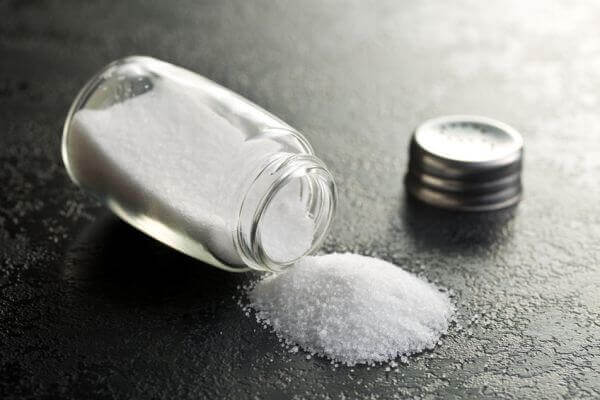
Sodium and potassium work together to operate a “pump” built into cells that is vital for maintaining their potential for action.
This cellular pump is always active, pushing sodium ions out and potassium ions in. It’s built to ensure cells contain relatively high amounts of potassium ions but low amounts of sodium ions.
Here’s a good video that shows how it works:
As you can see, your cells use this pump to maintain a balance of sodium, potassium, and fluid inside their walls.
Now, when you dramatically increase your intake of sodium, it throws off this intra-cellular balance.
Larger-than-normal amounts of sodium–and fluids–find their way into cells, which then have to “wait” for their pumps to bring things back to normal.
And you get to deal with that soft, bloated look that you hate so much while you wait. 🙂
Similarly, when you dramatically decrease potassium intake, this too causes water retention because potassium is necessary for the operation of the cellular pumps.
How Dehydration Causes Water Retention
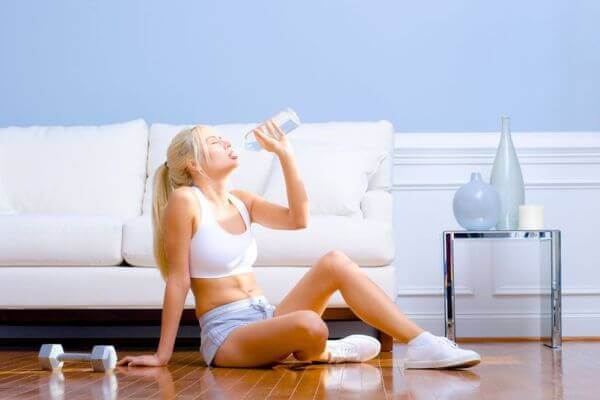
If you don’t give your body enough water through food and drinking, it takes action to hold on to the water it is getting.
This includes releasing hormones like aldosterone and vasopressin that increase water retention through various mechanisms.
The Bottom Line on What Causes Water Retention
The majority of the people I’ve spoken and worked with that struggled the most with water retention were…
- In a calorie deficit. And in many cases a large deficit.
- Doing large amounts of exercise. And particularly large amounts of cardio, which can chronically elevate cortisol levels.
- Not losing weight over the last several weeks. Despite the large calorie deficit and strenuous exercise routine. (And this is because, like the subjects of the Minnesota Experiment, they were losing fat but it was obscured by increased water retention.)
- Not paying attention to sodium and potassium intake. When they started logging it they realized that potassium intake was generally low and sodium intake was all over the place.
- Not drinking enough water. You can get a fair amount of water through the food you eat but not enough.
And in terms of a solution…we’ll get to that in a minute. First, we need to take a pit stop…
Is It Water Weight or Just Fat?
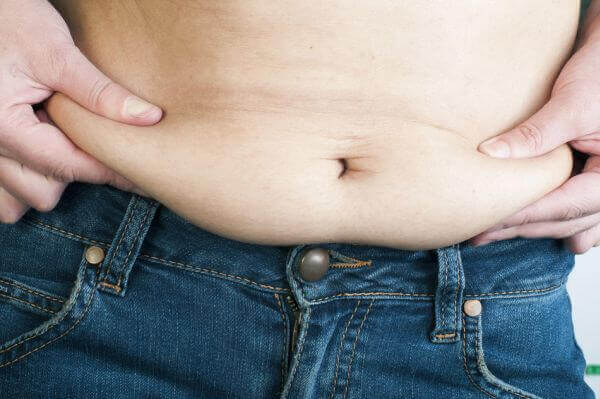
Why do people hate to admit they’re just fat?
Not bloated. Not holding water. Not thick skinned.
Just fat.
Help me Dan Ariely, you’re my only hope!
Alright…full disclosure…I can be just as guilty of this as anyone. Raise your hand if you’ve come off a weekend of a wee bit too much “cheating” and told yourself you’re just waterlogged.
*Head down and hand up*
Sometimes we have to face the music though. Sometimes the wiggly layer covering our abs isn’t water–it’s just fat.
How to know the difference, though?
Well, there are two different scenarios to address here.
If you’ve seen a rapid increase in weight…
You can only eat so many calories and your body can only digest and process so much food and synthesize so much fat in a day.
As a general rule, if you have gained more than a pound in one day, or an average of a pound per day over the course of several days, you can bet that a sizable portion of it is water weight.
Sure, this won’t hold for all situations–eat 10,000 calories of 5 Guys hamburgers for a week straight and you’re going to gain a lot of fat…but who does that anyway? *cough*
If your weight has been relatively stable…
Some people say that water retention feels “squishier” than body fat.
Others say that for the abdominal region in particular, you can “test” by pulling the skin away from your body and releasing it. If the area “ripples” as the skin returns to your body, you may be dealing with excess water retention.
Others still say they notice generalized swelling or larger-than-normal fingers or ankles when they’re holding large amounts of water.
Personally I haven’t found indicators like these reliable. They’re too subjective and variable from person to person.
I think the best way to make sense of your situation is to first (approximately) determine your body fat percentage.
The effects of water retention don’t become pronounced and distinguishable from body fat until you’re around 10% (men)/20% (women) body fat and under.
That is, if you’re a guy at 15% body fat, you’re going to look puffy and undefined regardless of how much or little water you’re holding. The same goes if you’re a girl at 25%.
If, however, you’re a guy at 10% or under, or a girl at 20% or under, you’re in the range where water retention can noticeably affect what you see in the mirror.
If this is you, then you can review the criteria I gave earlier…
- Calorie deficit.
- A lot of exercise every week.
- Not losing weight despite the above.
- Large/unknown fluctuations in sodium and potassium intake.
- Inadequate water intake.
And determine how likely it is that your jiggly bits are “soggy” and not just fatter than you want to admit.
How to Get Rid of Water Retention

Alright then…it’s time to put some rubber on the road.
If you’ve read everything up to this point then you already have a good idea about how to lose weight, but I’m going to spell it all out here.
You Probably Need to Reduce Your Sodium Intake
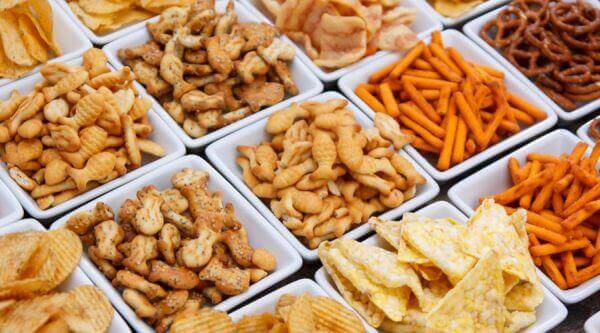
As you know, eating too much sodium in general promotes water retention and large fluctuations in sodium intake does as well.
Thus, by stabilizing your sodium intake at a healthy level, you can drop and stabilize water weight.
First, you want to get an idea of how much sodium you’re eating.
Check out the sodium content of the last week or so worth of food you’ve eaten using a tool like Calorie King. Don’t forget to add in guesstimates for how much salt you’ve been using as well (salt has about 2.3 grams of sodium per teaspoon).
If you’re like most people, you’re going to discover two things:
- You eat a lot of sodium.
- Your sodium intake fluctuates dramatically from day to day.
The solution is simple: eat less sodium and make this your daily norm.
In terms of how much sodium you should be eating, stick to the USDA’s recommendation of about 2.3 grams of sodium per day (and 1.5 grams for African Americans, individuals with hypertension, diabetes, or chronic kidney disease and individuals ages 51 and older).
(I should note, however, that people that sweat regularly may need more sodium to offset losses through sweating. I personally eat around 3.5 to 4 grams per day.)
Here are some good rules of thumb for keeping your sodium intake under control:
- Be wary of canned or pre-packaged foods.
They’re often loaded with sodium as a preservative.
- The same goes for deli meat.
And for the same reason. 🙂
- Reduce your use of table salt and certain seasonings.
Use salt sparingly and if needed, use a potassium-based salt substitute.
Watch out for mixed seasonings as well, like chili or pizza seasoning. They can contain quite a bit of sodium.
- Watch out for sauces and salad dressings.
Many are very high in sodium.
- Cheese can be a problem too.
For example, just one once of American cheese has nearly 500 milligrams of sodium.
While it might be annoying to plan/track yet another thing in your diet, don’t worry–you don’t have to track sodium intake forever.
Instead, you want to plan/track at first to see what works and what doesn’t and then just use common sense in maintaining good habits going forward.
Yes, that means your sodium intake is going to fluctuate some and occasionally spike with “cheat meals” and such, and that’s fine.
So long as your intake is stably in the right range most of the time, and you go back to normal right after occasional spikes, you’ll be fine.
And Raise Your Potassium Intake
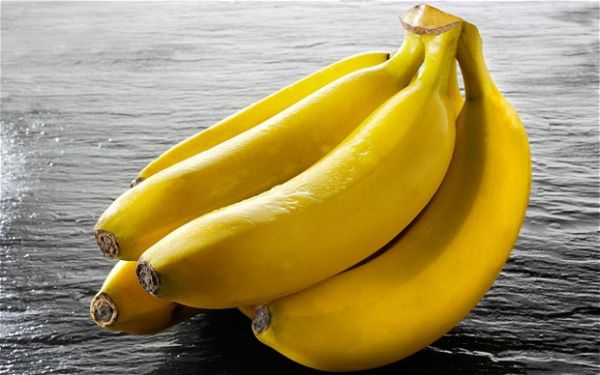
Insufficient potassium intake is one of the most common nutrient deficiencies in Western diets. The Institute of Medicine recommends 4.7 grams of potassium per day and, as of 2010, the average American intake was 2.64 grams per day.
The best sources of potassium are the types of foods many people avoid–fruits and vegetables–and hence the widespread problem.
This mineral imbalance contributes to water retention, but it’s a lot worse than that.
A study conducted by scientists from the Center for Disease Control and Harvard University found that people with the highest ratio of sodium to potassium were twice as likely to die of a heart attack and had a 50% higher risk of death from any cause than people with the lowest ratio.
The bottom line is people with diets very high in sodium and very low in potassium are playing with fire.
So pay attention to your sodium and potassium intake. Your life quite may literally, one day, depend on it.
How to Get Your Cortisol–and Water Retention–Under Control

Water retention is particularly common among dieters and the culprit is often chronically elevated cortisol levels.
There are simple things you can do to bring this hormone back to where you want it and shed the water…
Cut back on the exercise.
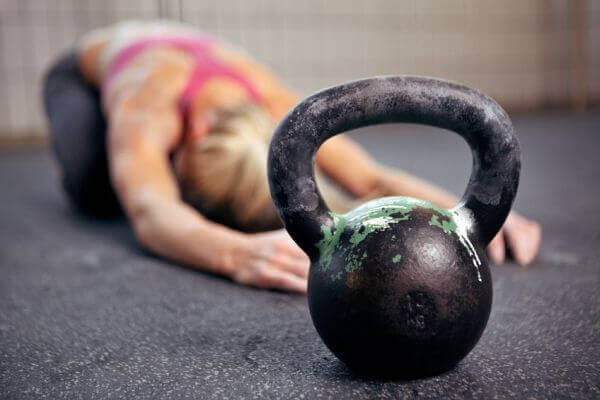
In my experience working with thousands of people, overtraining is far more common than under-training.
People are willing to work incredibly hard to reach their goals and figure the more they exercise, the faster they’ll get there.
Unfortunately, that’s only true up to a point.
Yes, training 5 hours per week is more effective than 1 hour, but 10 hours per week is not necessarily more effective than 5.
The reason for this is simple: intense exercise puts a lot of stress on your body and it needs time to rest and recover
This isn’t just muscular stress, either. The nervous system is also heavily involved and, if you try to demand too much of it, eventually it just can’t keep up.
So, here’s the long story short:
If you’re in a calorie deficit and you’re doing more than 4 to 6 hours of weightlifting and 1 to 2 hours of moderate-to-high-intensity cardio per week, you’re probably doing too much.
And if you’re doing that and also dealing with issues like water retention and general fatigue, I can basically guarantee that you’re doing too much.
If that’s you…or if it’s not quite you but you suspect your cortisol levels are too high…here’s what I want you to do:
- Do a deload week in the gym. Taking a short break from heavy lifting can be surprisingly restorative.
- Do no cardio for the week. No, this isn’t going to make you fat.
- Increase your calorie intake by 5 to 10%. Do this by increasing your carb intake. And no, this won’t make you fat either.
- Make sure you get enough sleep. Shoot for 7 to 8 hours per night.
Make sure you’re not in too severe of a calorie deficit.

The worst way to lose weight is to simply starve yourself and do a ton of cardio.
You can be aggressive with your calorie deficit and do well but not reckless.
That’s why I generally recommend a deficit of 20 to 25% for maximizing fat loss and minimizing muscle loss while also managing metabolic adaptation.
If you don’t know how to do this–how to approximate the amount of energy you’re burning every day and how much you should be eating–check out this article.
(And if you’d like even more specific advice about how many calories, how much of each macronutrient, and which foods you should eat to reach your goals, take the Legion Diet Quiz.)
Chill out.

You can reduce cortisol levels by simply taking some time each day to relax, take a nap, listen to some good music, drink some tea, do some deep breathing, and so forth.
Whatever calms you is worthwhile.
I share 10 scientifically proven ways to relax and lower cortisol here. Check ’em out and put them to good use!
Get more sleep.

High-quality sleep is getting scarcer and scarcer these days thanks to ever-increasing obesity rates, work hours, TV watching, video game playing, and other distractions that keep us up at night.
Well, when your body is asleep, it might look inactive, but that’s far from the case.
It’s very busy repairing tissue and producing hormones—functions that are especially important if you’re subjecting your body to increased levels of stress every day through dieting and exercising.
Unfortunately, if you’re like most people, you don’t get as much sleep as you should.
I’m not going to point fingers here–I’m often just as guilty as the rest of us–but if you’re dealing with cortisol issues, it’s time to spend more time with Morpheus.
Eat a Bunch of Food

Yeah, you read that correctly.
Remember what triggered the rapid weight loss with the starved subjects of the Minnesota Experiment?
Large increases in calories. Or, in fitness parlance, “cheat meals.”
I mentioned earlier that this was due to a reduction in cortisol levels, so let’s take a closer look at how this actually works.
The key is a hormone called leptin, which is produced by fat cells, and which regulates many things in the body such as hunger, metabolic rate, appetite, libido, and more.
- When you’re in a calorie deficit, your leptin levels drop, and this triggers a cascade of unwanted side effects like a reduction in metabolic rate, increased appetite, and even depression.
It also causes cortisol levels to rise.
- On the other hand, when you give your body more energy (calories) than it needs, leptin levels are boosted, which can then reverse–to varying degrees–some of the negative effects given above (including the elevation in cortisol levels).
So…sometimes the “secret” dropping water weight is simply indulging in some tasty food.
That said, I don’t recommend eating just anything. If you want to get the most anti-bloat bang for your calories, you want to do a “refeed day.” Click here to learn how it works.
Drink Enough Water
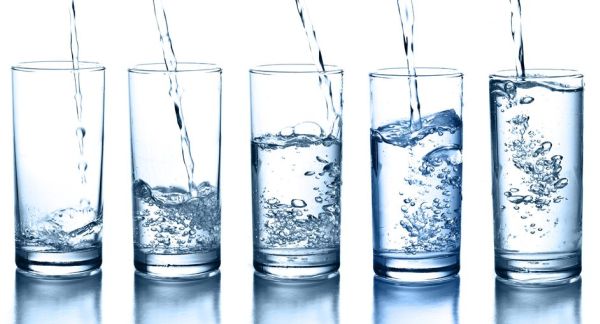
The Institute of Medicine recommends that we get about a gallon of water per day, and while we do get a fair amount from food, this requires drinking at least a few liters of water every day.
Personally I drink about 1 to 1.5 gallons per day because I lose a fair amount of water through my daily exercise and living in Florida (sweating).
In terms of what type of water is best to drink, research shows that tap water is becoming more and more contaminated with all kinds of pollutants–bacteria, pharmaceuticals, heavy metals, and various types of poisonous chemicals.
Bottled water isn’t much better, either. It’s exorbitantly expensive and research shows that it’s often chock full of chemicals too.
One study examined 18 different bottled waters from 13 different companies and found over 24,000 chemicals present including endocrine disruptors.
Martin Wagner, a scientist at Goethe University Frankfurt’s Department of Aquatic Ecotoxicology and author of the study, had this to say:
“Bottled water had a higher contamination of chemicals than glass bottles. There are many compounds in bottled water that we don’t want to have there. Part is leaching from the plastic bottles, lids or contamination of the well.”
This is why I recommend you invest in an effective water filtration device such as the ZeroWater pitcher or iSpring reverse osmosis system, and why I myself stick to filtered water.
Keep in mind that what you want to achieve with water filtration is very low levels of dissolved solids in the water, as measured in “parts per million.” The closer to 0, the better. (Tap water generally tests at anywhere from 200 to 700 PPM of dissolved solids.)
You can measure the levels of dissolved solids in your water using an electronic water tester like this one. It’s what I use to keep an eye on my water quality so I know when filters need to be changed.
Do Natural Diuretics Work?

There are many foods and naturally occurring substances that supposedly have diuretic effects, including…
- Caffeine
- Alcohol
- Celery
- Onion
- Eggplant
- Asparagus
- Hawthorn
- Parsley
- Watermelon
- And more…
Well, like the bogus “fat burning food” pitch, the idea of magically dropping large amount of water weight by making slight changes to our diets and supplement regimens sounds great…but it doesn’t work like that.
The reason for this is simple: while there are natural substances that exert mild diuretic effects, they don’t address the cause of the water retention and thus can’t resolve the issue.
For example, caffeine and alcohol posses slight diuretic effects but they’re so slight that the amount of liquid you consume to get the molecules can offset it.
Similarly, research shows that hawthorn and parsley are natural diuretics but their effects are mild and temporary.
The reality is if you’re struggling with water retention, fixing it is going to require lifestyle changes and not pills and powders.
The only situation where I would recommend turning to natural diuretics is if you’re very lean and have a competition or photo shoot or some other one-day affair that requires you look as dry and defined as possible.
That’s why many fitness competitors restrict carbohydrate intake leading up to a show, often restrict sodium intake several days before going on stage, and add several natural diuretics to their regimen. (Well, let’s be real–most competitors use diuretic drugs and other compounds to increase hardness as well, which are much more effective than anything you can buy on Amazon).
The Bottom Line on Water Retention

Water retention throws many a dieter for a loop.
It makes people think that energy balance is a hoax….that calorie counting doesn’t work…that their metabolisms are “broken” or hormones are screwed…and all kinds of other voodoo nonsense.
Desperate for a change, many of these people then set off to find silver bullet fixes and turn to fad dieting, silly or even dangerous supplements, and grueling exercise routines.
And when all that fails, desperation often turns into despair and they just give up.
Well, that vicious cycle can be completely avoided by applying what I lay out in this article. I hope you’ve found it helpful.
What’s your take on water retention? Have anything else to share? Let me know in the comments below!
Scientific References +
- Kreydiyyeh SI, Usta J. Diuretic effect and mechanism of action of parsley. J Ethnopharmacol. 2002;79(3):353-357. doi:10.1016/s0378-8741(01)00408-1
- Yarnell E, Ventola CL, Vahlensieck W, et al. Fitoterapia na actualidade, Plantas e Produtos Vegetais em Fitoterapia. Gulbenkian FC, ed. Plantas e Prod Veg em Fitoter. 2006;20(8):21-25. doi:10.3390/ijms160818396
- Hobson RM, Maughan RJ. Hydration Status and the Diuretic Action of a Small Dose of Alcohol. Alcohol Alcohol. 2010;45(4):366-373. doi:10.1093/alcalc/agq029
- Maughan RJ, Griffin J. Caffeine ingestion and fluid balance: A review. J Hum Nutr Diet. 2003;16(6):411-420. doi:10.1046/j.1365-277X.2003.00477.x
- Wagner M, Schlüsener MP, Ternes TA, Oehlmann J. Identification of Putative Steroid Receptor Antagonists in Bottled Water: Combining Bioassays and High-Resolution Mass Spectrometry. Picard D, ed. PLoS One. 2013;8(8):e72472. doi:10.1371/journal.pone.0072472
- White CL, Purpera MN, Ballard K, Morrison CD. Decreased food intake following overfeeding involves leptin-dependent and leptin-independent mechanisms. Physiol Behav. 2010;100(4):408-416. doi:10.1016/j.physbeh.2010.04.006
- Leal-Cerro A, Soto A, Martínez MA, Dieguez C, Casanueva FF. Influence of cortisol status on leptin secretion. Pituitary. 2001;4(1-2):111-116. doi:10.1023/A:1012903330944
- JÉQUIER E. Leptin Signaling, Adiposity, and Energy Balance. Ann N Y Acad Sci. 2006;967(1):379-388. doi:10.1111/j.1749-6632.2002.tb04293.x
- Yang Q, Liu T, Kuklina E V., et al. Sodium and potassium intake and mortality among US adults: Prospective data from the third national health and nutrition examination survey. Arch Intern Med. 2011;171(13):1183-1191. doi:10.1001/archinternmed.2011.257
- Anastasiou CA, Kavouras SA, Arnaoutis G, et al. Sodium replacement and plasma sodium drop during exercise in the heat when fluid intake matches fluid loss. J Athl Train. 2009;44(2):117-123. doi:10.4085/1062-6050-44.2.117
- Skoluda N, Dettenborn L, Stalder T, Kirschbaum C. Elevated hair cortisol concentrations in endurance athletes. Psychoneuroendocrinology. 2012;37(5):611-617. doi:10.1016/j.psyneuen.2011.09.001
- Albåge A, van der Linden J, Bengtsson L, Lindblom D, Kennebäck G, Berglund H. Elevations in antidiuretic hormone and aldosterone as possible causes of fluid retention in the Maze procedure. Ann Thorac Surg. 2001;72(1):58-64. doi:10.1016/s0003-4975(01)02688-1
- Bouby N, Fernandes S. Mild dehydration, vasopressin and the kidney: Animal and human studies. Eur J Clin Nutr. 2003;57(SUPPL.2). doi:10.1038/sj.ejcn.1601900
- Verrey F. Antidiuretic hormone action in A6 cells: effect on apical Cl and Na conductances and synergism with aldosterone for NaCl reabsorption. J Membr Biol. 1994;138(1):65-76. doi:10.1007/bf00211070
- Bouby N, Fernandes S. Mild dehydration, vasopressin and the kidney: Animal and human studies. Eur J Clin Nutr. 2003;57(SUPPL.2). doi:10.1038/sj.ejcn.1601900
- Gallen IW, Rosa RM, Esparaz DY, et al. On the mechanism of the effects of potassium restriction on blood pressure and renal sodium retention. Am J Kidney Dis. 1998;31(1):19-27. doi:10.1053/ajkd.1998.v31.pm9428447
- Whitworth JA, Mangos GJ, Kelly JJ. Cushing, cortisol, and cardiovascular disease. Hypertens (Dallas, Tex 1979). 2000;36(5):912-916. doi:10.1161/01.hyp.36.5.912
- Lawson EA, Donoho D, Miller KK, et al. Hypercortisolemia is associated with severity of bone loss and depression in hypothalamic amenorrhea and anorexia nervosa. J Clin Endocrinol Metab. 2009;94(12):4710-4716. doi:10.1210/jc.2009-1046
- Gallen IW, Rosa RM, Esparaz DY, et al. On the mechanism of the effects of potassium restriction on blood pressure and renal sodium retention. Am J Kidney Dis. 1998;31(1):19-27. doi:10.1053/ajkd.1998.v31.pm9428447
- Singer DR, Markandu ND, Buckley MG, et al. Blood pressure and endocrine responses to changes in dietary sodium intake in cardiac transplant recipients. Implications for the control of sodium balance. Circulation. 1994;89(3):1153-1159. doi:10.1161/01.cir.89.3.1153
- Heer M, Frings-Meuthen P, Titze J, et al. Increasing sodium intake from a previous low or high intake affects water, electrolyte and acid-base balance differently. Br J Nutr. 2009;101(9):1286-1294. doi:10.1017/S0007114508088041
- Connell JMC, Whitworth JA, Davies DL, Lever AF, Mark Richards A, Fraser R. Effects of ACTH and cortisol administration on blood pressure, electrolyte metabolism, atrial natriuretic peptide and renal function in normal man. J Hypertens. 1987;5(4):425-433. doi:10.1097/00004872-198708000-00007










